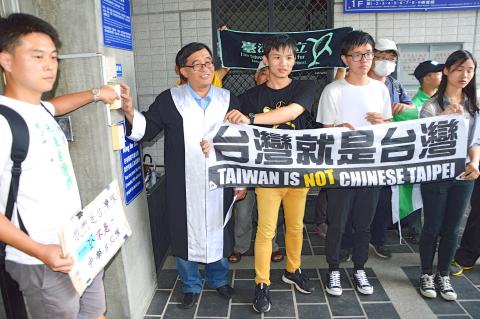The Chinese Taipei Baseball Association (CTBA) yesterday apologized for evicting a group of fans who were waving a banner reading “Taiwan is not Chinese Taipei” ahead of a match between Taiwan and Japan at an under-18 international baseball tournament in Taichung on Wednesday.
A group of Providence University students, who were calling for the replacement of the term “Chinese Taipei,” were evicted from the game at the 11th Baseball Federation of Asia Under-18 Championship for holding what the association said was a political slogan.
Two association members tried to snatch the banner from the students and the students were escorted from the stadium soon afterward.

Photo: Chang Jui-chen, Taipei Times
After a video capturing the scuffle went viral on the Internet, Chinese Taipei Baseball Association secretary-general Lin Chung-cheng (林宗成) apologized for the actions of the association’s members following criticism from the city government, politicians and netizens.
Lin said according to International Olympic Committee (IOC) rules, political banners are banned from international sports competitions, but that the association would handle such a situation with more care in the future.
The association is to designate a “protest area” near the stadium entrance, but protests are not allowed inside the stadium, Lin said.
He called on the government to establish a standard reaction procedure, as the association has little experience in handling such incidents.
The Taichung City Government said the association enforced the rule too vociferously and that freedom of speech must be protected as long as it does not disrupt the game.
“The association has to compensate and apologize for the fans’ losses,” Taichung Information Bureau Director-General Cho Kuan-ting (卓冠廷) said, adding that the city government would deploy additional police officers at the stadium to protect the rights of fans.
“The city government will respect fans’ rights to hold national flags or slogans as long as they do not interfere with other people,” Chou said.
Democratic Progressive Party (DPP) Legislator Huang Kuo-shu (黃國書) said the banner in question was not political, but merely an expression of an opinion.
“Whatever does not serve the interests of particular politicians or political parties should not be understood as political. Taiwan is a free country and it is unreasonable to enforce the IOC rules restrictively,” Huang said.
DPP Legislator Chang Liao Wan-chien (張廖萬堅), who is a director of the association, said the term “Chinese Taipei” is a compromise that Taiwan has to accept to enter international sports competitions and dissatisfaction with the term is understandable.
“The slogan was nothing unusual, but the association’s overreaction saw it make the headlines,” Chang Liao said.
Sports Administration Director Lin Jer-hung (林哲宏) said the agency would set up a standard procedure to handle similar situations and prevent conflict.
Meanwhile, the students yesterday took their case to court, accusing two members of the association of unnecessary use of force and damage to property.
They said freedom of speech must be protected and reasserted their opinion that the nation should use “Taiwan” when participating in international sports competitions.
Lawyer Cheng Yi-ying (鄭懿瀛), who is helping the students, said the association’s ban on political banners is against freedom of speech and that the association would be censoring fans if it plans to define what slogans or objects are political.

PREPAREDNESS: Given the difficulty of importing ammunition during wartime, the Ministry of National Defense said it would prioritize ‘coproduction’ partnerships A newly formed unit of the Marine Corps tasked with land-based security operations has recently replaced its aging, domestically produced rifles with more advanced, US-made M4A1 rifles, a source said yesterday. The unnamed source familiar with the matter said the First Security Battalion of the Marine Corps’ Air Defense and Base Guard Group has replaced its older T65K2 rifles, which have been in service since the late 1980s, with the newly received M4A1s. The source did not say exactly when the upgrade took place or how many M4A1s were issued to the battalion. The confirmation came after Chinese-language media reported

A Ministry of Foreign Affairs official yesterday said that a delegation that visited China for an APEC meeting did not receive any kind of treatment that downgraded Taiwan’s sovereignty. Department of International Organizations Director-General Jonathan Sun (孫儉元) said that he and a group of ministry officials visited Shenzhen, China, to attend the APEC Informal Senior Officials’ Meeting last month. The trip went “smoothly and safely” for all Taiwanese delegates, as the Chinese side arranged the trip in accordance with long-standing practices, Sun said at the ministry’s weekly briefing. The Taiwanese group did not encounter any political suppression, he said. Sun made the remarks when

The Taiwanese passport ranked 33rd in a global listing of passports by convenience this month, rising three places from last month’s ranking, but matching its position in January last year. The Henley Passport Index, an international ranking of passports by the number of designations its holder can travel to without a visa, showed that the Taiwan passport enables holders to travel to 139 countries and territories without a visa. Singapore’s passport was ranked the most powerful with visa-free access to 192 destinations out of 227, according to the index published on Tuesday by UK-based migration investment consultancy firm Henley and Partners. Japan’s and

BROAD AGREEMENT: The two are nearing a trade deal to reduce Taiwan’s tariff to 15% and a commitment for TSMC to build five more fabs, a ‘New York Times’ report said Taiwan and the US have reached a broad consensus on a trade deal, the Executive Yuan’s Office of Trade Negotiations said yesterday, after a report said that Washington is set to reduce Taiwan’s tariff rate to 15 percent. The New York Times on Monday reported that the two nations are nearing a trade deal to reduce Taiwan’s tariff rate to 15 percent and commit Taiwan Semiconductor Manufacturing Co (TSMC, 台積電) to building at least five more facilities in the US. “The agreement, which has been under negotiation for months, is being legally scrubbed and could be announced this month,” the paper said,